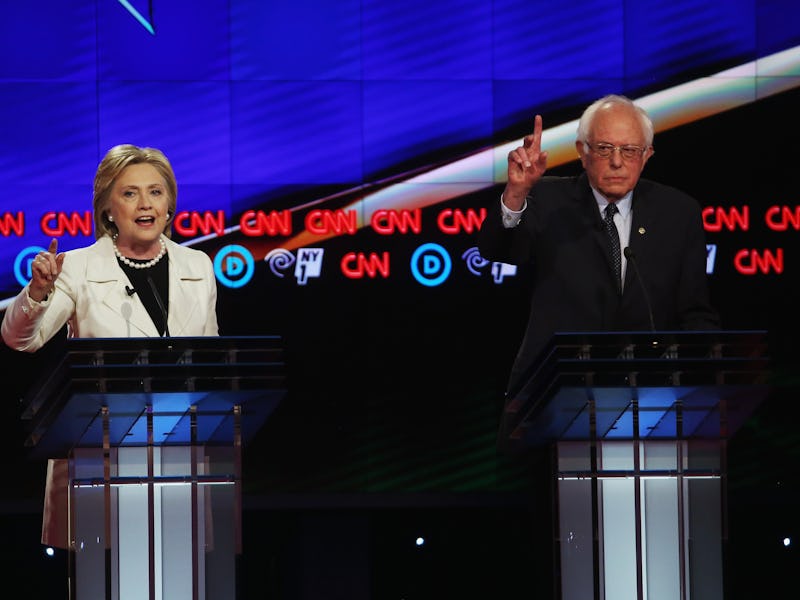Bernie Sanders Calls for Clean Energy Reform "Not Tomorrow, but Yesterday"
Hillary Clinton agrees, but doesn't think he's being realistic.

After tax returns and assault rifles, the conversation at Thursday’s Democratic Debate turned to climate change. Both candidates Hillary Clinton and Bernie Sanders are vocal about their belief in climate change — unlike the Republican nominees — but differ in approach.
Sanders came out strong, arguing that the threat posed by climate change was akin to a military attack on the country, something he’s been saying since the first Democratic debate.
“We have an enemy out there, and that enemy is going to cause drought and floods and extreme weather disturbances,” Sanders said. “There’s going to be international conflict.”
Clinton said she wants to end subsidies on big oil, and work with Congress to continue President Obama’s progress toward a greener future for America, but acknowledged that moving environmental legislation through Congress and refitting the country’s power grid to rely on clean energy would take time.
“We did say natural gas is a bridge,” Clinton said. “We want to cross that bridge as quickly as possible, because in order to deal with climate change, we have got to move as rapidly as we can.”
Sanders criticized Clinton for her support from the fossil fuels industry, her lack of support for a carbon tax, and her complicated position on fracking.
“We have got to lead the world in transforming our energy system, not tomorrow, but yesterday,” Sanders said to CNN moderator Wolf Blitzer. “And, what that means, Wolf, it means having the guts to take on the fossil fuel industry.”
Sanders has also called for moving the country away from nuclear energy — which currently makes up nearly 20 percent of America’s power. Climate experts think this could be one of the biggest problems with Sanders’s plan, as trying to reduce emissions while completely eliminating a source of clean energy would significantly increase the country’s consumption of fossil fuels, making his plan a non-starter.
Climate change isn’t just an American problem — Clinton also pointed to her foreign policy experience in trying to get China and India to reduce their own omissions. She said Obama’s leadership at the recent Paris summit was a “major accomplishment,” and that she wanted to “set big goals” for environmental progress, like putting in 500 million more solar panels in private homes in her first term in office, and generate “enough clean energy to provide electricity to every home in America within 10 years.” The big difference, Clinton said, was that she was willing to work through a difficult political climate (and Republican controlled Congress) to make steps toward a solution.
“And my approach I think is going to get us there faster without tying us up into political knots,” she said. “It’s easy to diagnose the problem. It’s harder to do something about the problem.”
The candidates’ positions on climate change reflect their ideologies on a lot of issues. Clinton favors slower, incremental steps working inside of the political system to find ways to make as much progress as possible without losing political capital. Sanders, however, advocates for swift and immediate change along strict ideological lines.